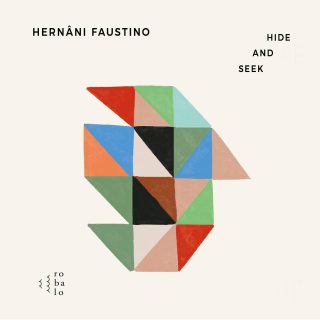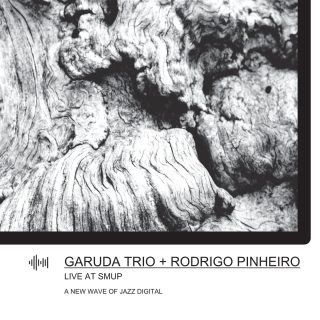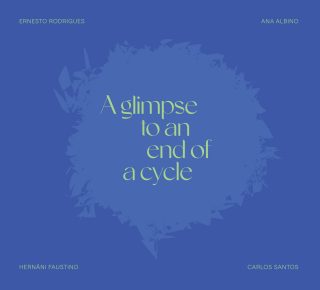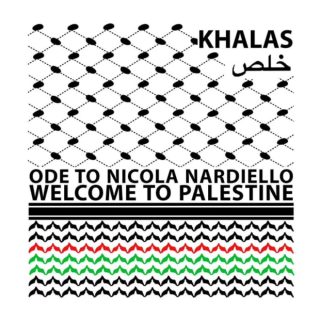
Motian & More Gratitude (phonogramunit)
José Lencastre tenor saxophone
Pedro Branco electric guitar
Hernâni Faustino double bass
João Sousa drums
“…A lot of times when we’re playing, I don’t really have any idea what I’m going to do. I’m going by what I’m feeling and what I’m hearing. Sounds turn me on.” Paul Motian
Tracks 1and 2 recorded live by Cláudio Rego at SMUP, Parede on June 24, 2022
Tracks 3, 4 and 5 recorded live by Rui Galveias at BOTA, Lisbon on March 1, 2023
Mix and mastered by David Zuchowski at Davernoise Studio, Chicago
Produced by Hernâni Faustino
Executive Production by Phonogram Unit
Cover painting “Identidade/Multiplicidades” : Ivo
Painting photo: Margarida Dias
Band photo: Nuno Martins
Track 1 by Thelonious Monk
Published by Embassy Music. Corp.
Tracks 2,3,4 and 5 by Paul Motian
Published by Yazgol Music
Ⓟ Hernâni Faustino, 2025
Ⓒ Hernâni Faustino, 2025
Ⓛ SPA 2025
_______________________________

Hernâni Faustino Hide and Seek (Robalo)
Hernâni Faustino double bass
Hernâni Faustino is a pivotal figure in Lisbon’s free jazz and improvised music scene, renowned for his expressive double bass work that blends rich tonal depth with a wide range of extended techniques. Self-taught, he transitioned from electric bass in alternative rock bands during the 1980s to double bass in the 1990s, dedicating himself to avant-garde and improvised music.
Faustino’s playing is characterized by a deep, resonant tone and a mastery of both arco and pizzicato techniques. He often employs unconventional methods—such as percussive bowing, harmonics, and textural layering—to explore the full sonic potential of the double bass. His improvisations are marked by a balance between introspective lyricism and dynamic interplay, making him a sought-after collaborator in the free jazz community.
The metaphor of Hide and Seek, new solo record is a powerful lens through which to understand the art of musical improvisation, especially in free or exploratory settings. The roles of the seeker and the hider can mirror the dynamic between musicians as they navigate sound, space, and surprise, sometimes revealing, sometimes concealing. Just as in the children’s game, much of the excitement lies in the chase, the unexpected discovery, the near-miss, or the deliberate misdirection. This interplay creates a rich field of tension and release, listening and reacting, building and withholding.
Recorded by João Almeida at Penh asco Arte Cooperativa on November 26th, 2023
Mixed by João Almeida
Mastered by Rodrigo Pinheiro
Design by Maria Bouza
Special thanks to Robalo crew
All music by Hernâni Faustino
_______________________________

Garuda Trio + Rodrigo Pinheiro Live at Smup (A New Wave of Jazz)
Hugo Costa alto saxophone
Rodrigo Pinheiro piano
Hernâni Faustino double bass
João Valinho drums
Recorded live in concert by Kellzo at SMUP, March 21th 2024. Mixed and mastered by Rodrigo Pinheiro.
Photography by Martina Verhoeven / martinaverhoeven.com
Executive label director : Dirk Serries.
This is a digital-exclusive A New Wave Of Jazz release (nwoj0071).
________________________________

Uivo Zebra Deus Montanha (phonogramunit)
The new record of Uivo Zebra is a turnaround on the sound and explorations in the music of the band.
Deus Montanha was recorded during a residency at the beautiful Smup in Parede. During these days the band explored new territories and added more space to the music, making every sound count to the final work of this vey intriguing recording.
Hernâni Faustino electric bass, percussion, vocals
João Svayam drums, tibetan bowls, feng gong, chimes, vocals
Jorge Nuno electric guitar, vocals
All music by Uivo Zebra
Deus Montanha was recorded during an Artist Residency in SMUP
5,6 and 7 January 2021, by João Svayam
Mixed on September 2021 by João Svayam at Estudantina Recreativa de S.Domingos de Rana
Mastered by James Plotkin
Produced by Uivo Zebra
Cover: detail of ilustration by Dilar Pereira
Design by João Svayam

A Glimpse to an end of a Cycle (Creative Sources)
Ernesto Rodrigues viola & crackle box
Ana Albino electric guitar & fx
Hernâni Faustino double bass
Carlos Santos modular synthesizer
Live recording during the CS Improvised Music Series, on January 16th 2025 at Cossoul, Lisbon.
Recording, master & graphic design by Carlos Santos.
Foto by Inês Ferreira.
Production by Ernesto Rodrigues

Khalas Ode to Nicola Nardiello (Welcome to Palestine) Muzic Plus
The trio Khalas (خلص), which in Arabic can mean “stop, enough, finished,” is formed by chance during the January 2024 meetings of the Free Flow Fest in the province of Bari, in Puglia (Italy).
Riding the wave of emotion from the exciting concert held at the Arci Gramigna club in Bari (one of the few clubs supporting the culture of improvised music in Puglia), the group decides to record in Monopoli (Bari), at the Waveahead studio, expertly managed by my dear friend Mimmo Galizia.
After a good morning coffee, the only certainty is the recording device I suggested: B.I.C.
(Blind Instant Composition).
At first, Giacomo doesn’t seem to fully approve of the unusual setup. He wants us to look at each other. Hernâni, silent, tunes the double bass and begins to warm up. I, excited, start setting up my no-input trombone.
The trio explores various timbral possibilities: intuitive composition in real-time is the foundation of this sonic work. Friendship and mutual recognition of artistic qualities is the glue that solidifies the forms and colors diluted over time. The album is dedicated to a dear friend of mine, who passed away prematurely last year. Thanks to Nicola’s suggestions, I was able to live and work with music in Palestine, and without his contribution, I wouldn’t be who I am today. And this album probably would never have been born. Thank you, Nicola.
Enjoy the listening experience.
Carlo Mascolo input trombone
Hernâni Faustino double bass
Giacomo Mongelli drums
All compositions by Carlo Mascolo, Hernâni Faustino, Giacomo Mongelli
Recorded on 13th of january 2024 by Mimmo Galizia at Waveahead Studio – Monopoli, Italy.
Recording device: Carlo Mascolo
Mixed and Mastered by Mimmo Galizia may 2024.
Executive Production: Muzic Plus
